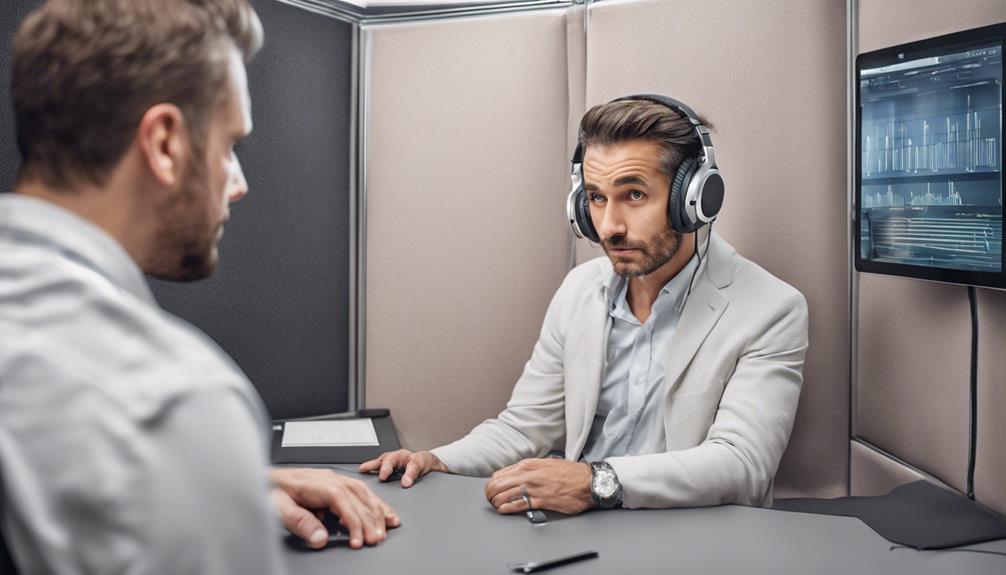The saying ‘actions speak louder than words’ rings true when it comes to our hearing. Signs of potential hearing loss can be subtle but impactful, such as mishearing conversations or needing to turn up the volume.
But what if these are the early whispers of a deeper issue? Stay tuned as we unravel the mysteries of hearing loss and explore the telltale signs that often go unnoticed until it's too late.
Key Takeaways
- Difficulty discerning speech in noisy environments is a sign of potential hearing loss.
- Increased sensitivity to loud noises may indicate changes in hearing abilities.
- Regular hearing screenings can help detect early signs of hearing loss.
- Seeking professional evaluation promptly can prevent further deterioration in hearing health.
Common Signs of Hearing Loss
When assessing potential hearing loss, common signs to watch for include difficulty discerning conversations or speech in noisy environments. Background noise can make it challenging to focus on specific sounds, especially for individuals experiencing hearing loss.
Moreover, if one finds themselves needing increased volume levels for activities like watching TV, listening to music, or engaging in phone calls, it could indicate deteriorating hearing. Sensitivity to loud noises or discomfort in noisy settings is another red flag that shouldn't be ignored, as it may signal potential hearing loss.
Additionally, struggling with understanding high-pitched sounds or voices, such as children's voices, could point to hearing impairment. Individuals experiencing hearing loss might also feel overwhelmed or fatigued in social situations due to the effort required to follow conversations.
Recognizing these signs promptly can lead to early intervention and management of hearing loss.
Impact of Aging on Hearing

As we age, our hearing abilities naturally decline, with many individuals experiencing age-related hearing loss starting around 60 years old. Changes in the inner ear structures and nerve pathways can result in difficulties hearing high-pitched sounds as we get older.
This gradual loss of hearing, known as presbycusis, can impact speech understanding, especially in noisy environments.
Aging and Hearing Loss
What impact does aging have on hearing, and how does it contribute to gradual hearing loss over time?
Age-related hearing loss, affecting older adults, stems from changes in the inner ear that lead to a gradual reduction in hearing ability. This decline can significantly impact daily activities, communication skills, and overall quality of life for individuals aged 75 and older.
Moreover, age-related hearing loss isn't solely limited to the ears but can also contribute to balance issues due to the inner ear's role in maintaining balance and spatial awareness.
As hearing diminishes with age, cognitive functions may also be affected, resulting in challenges with short-term memory, processing humor, and staying focused during conversations.
Hearing Decline With Age
Aging significantly impacts hearing abilities, with individuals typically experiencing the onset of hearing decline around the age of 50 for men and the early to mid-60s for women. Age-related hearing loss, a common occurrence in individuals aged 75 and above, can impede daily activities and communication, leading to social challenges.
Regular check-ups are crucial for the early detection of this gradual deterioration in hearing ability. The inner ear's role in balance can also be affected by age-related hearing loss, underscoring the importance of addressing hearing decline promptly.
Understanding the impact of aging on hearing can help individuals take proactive steps to preserve their auditory health and maintain a high quality of life as they age.
Noise-Induced Hearing Loss Symptoms
Exposure to loud noise can result in various symptoms of noise-induced hearing loss, including difficulty hearing high-pitched sounds. This type of hearing loss can manifest in different ways, indicating potential damage to the sensitive structures of the ear.
Some common symptoms of noise-induced hearing loss include:
- Struggling to follow conversations in noisy environments.
- Difficulty understanding speech over the phone.
- Increased sensitivity to loud noises.
- Experiencing ringing in the ears, known as tinnitus.
These signs serve as early indicators that the auditory system may have been compromised due to exposure to excessive noise levels. Monitoring these symptoms and seeking professional evaluation can help in managing and potentially preventing further deterioration of hearing abilities.
Noise-induced hearing loss is a serious concern in today's world where loud sounds are prevalent, and being aware of these symptoms is crucial for preserving auditory health.
Recognizing Speech Difficulties

We need to be aware that difficulty in distinguishing speech sounds like f and s could indicate potential hearing loss.
Misunderstanding words or needing frequent repetitions during conversations could be early signs of declining hearing.
Struggling to hear and follow discussions in noisy environments could also be an indication of deteriorating hearing.
Speech Clarity Decline
In the process of declining hearing, individuals may notice a gradual difficulty in distinguishing speech sounds, particularly high-frequency sounds such as f, s, and th. This can lead to various challenges that impact speech clarity and understanding.
When experiencing speech clarity decline, individuals may find themselves struggling to understand conversations, especially in noisy environments where background noise interferes. Additionally, there may be sensitivity to changes in voice pitch and tone, which can affect the perception of speech. Following rapid speech or trying to engage in conversations with multiple speakers may pose significant challenges.
As a result, individuals might increasingly rely on lip reading or visual cues to compensate for unclear speech sounds.
- Struggling to understand conversations in noisy environments.
- Sensitivity to changes in voice pitch affecting speech perception.
- Challenges in following rapid speech or conversations with multiple speakers.
- Increased reliance on lip reading for clarity in communication.
Understanding Conversations Becomes Challenging
Amidst the challenges of speech clarity decline, the progression of hearing loss can manifest in the form of difficulties in understanding conversations, particularly in environments with background noise. When conversations become challenging, especially in noisy settings, it may be a sign of deteriorating hearing.
Struggling to discern words or sentences, needing frequent repetitions, or finding it hard to follow discussions in crowded places can be indicative of deafness progression. Additionally, if phone conversations pose difficulties due to unclear speech or muffled sounds, it could further highlight potential issues with hearing.
The gradual decline in the ability to engage in conversations effectively may serve as an early warning sign of impending deafness.
Understanding Ringing in the Ears

Experiencing ringing in the ears, also known as tinnitus, can be a common indicator of underlying hearing issues such as age-related hearing loss or exposure to loud noises. Tinnitus is a prevalent symptom that may present as ringing, buzzing, or hissing sounds and shouldn't be ignored. Here are some essential points to consider regarding ringing in the ears:
- Tinnitus can arise from various factors including exposure to loud noises, age-related hearing loss, ear infections, or underlying health conditions.
- Persistent tinnitus can have a significant impact on one's quality of life, leading to distress, sleep disturbances, and difficulty concentrating.
- Treatment options for tinnitus encompass sound therapy, counseling, relaxation techniques, and, in some cases, medical interventions to address root causes.
- Seeking medical evaluation for persistent tinnitus is crucial to identify the underlying cause and explore appropriate management strategies.
Understanding the nuances of tinnitus and its implications can aid in early detection and effective management of potential hearing issues.
Importance of Early Detection

Early detection of hearing loss plays a crucial role in effective intervention and prevention of further decline. Timely identification of hearing issues through regular assessments can significantly improve an individual's quality of life.
By being vigilant of warning signs such as difficulty following conversations, asking for frequent repetitions, or experiencing ringing in the ears, individuals can promptly seek evaluation and necessary interventions. Intervention strategies are most successful when hearing problems are detected early, allowing for timely management and support.
Addressing hearing loss proactively not only helps prevent further deterioration but also enhances overall well-being and communication abilities. The impact of early detection goes beyond just hearing; it positively influences social interactions, emotional health, and cognitive functions.
Therefore, prioritizing regular hearing screenings and being proactive in managing any identified issues can lead to a better quality of life and improved overall health outcomes.
Seeking Professional Hearing Tests

When considering the health of our ears, seeking professional hearing tests is a proactive step towards maintaining optimal hearing abilities. Professional hearing tests play a crucial role in the early detection of potential hearing loss, allowing for timely intervention and management. Here are some key points to consider:
- Early Signs Detection: Professional hearing tests can identify early signs of hearing loss that may go unnoticed.
- Comprehensive Evaluations: These tests involve a range of evaluations to assess different aspects of hearing ability thoroughly.
- Specialized Equipment: Audiologists utilize specialized equipment to measure hearing thresholds accurately and pinpoint specific areas of impairment.
- Treatment Guidance: Results from these tests provide valuable insights into the degree and type of hearing loss, guiding appropriate treatment strategies.
Regular professional hearing screenings are essential for monitoring changes in hearing health over time, ensuring that any issues are addressed promptly and effectively.
Lifestyle Changes for Hearing Health

Regularly engaging in cardiovascular exercise can improve blood flow to the inner ear, supporting overall hearing health. Additionally, maintaining a diet rich in antioxidants, vitamins, and minerals can reduce the risk of age-related hearing loss. It is crucial to limit exposure to loud noises and wear ear protection in noisy environments to prevent damage to your hearing. Avoiding smoking and excessive alcohol consumption is also essential, as these habits can contribute to hearing loss over time. Staying hydrated is another key aspect to ensure the proper function of the tiny hair cells in the inner ear responsible for detecting sound waves.
| Lifestyle Changes for Hearing Health | ||
|---|---|---|
| Cardiovascular Exercise | Healthy Diet | Noise Protection |
| Improves blood flow to the inner ear | Rich in nutrients | Prevents hearing damage |
| Avoid Smoking | Hydration | |
| Reduces hearing loss risk | Essential for hair cell function |
Frequently Asked Questions
How Can I Tell if I'm Going Deaf?
We can identify potential deafness by paying attention to signs like:
- Struggling to hear conversations
- Needing higher volume for media
- Difficulty understanding speech in noisy places
- Experiencing sensitivity to loud noises or ringing in the ears
Seeking professional evaluation is crucial if these symptoms arise. It's essential to address any potential hearing impairment promptly for appropriate management and care.
What Are the Early Warning Signs of Hearing Loss?
We can spot early signs of hearing loss by paying attention to cues like struggling with conversations in noisy settings, difficulty hearing high-pitched sounds, and needing to crank up the volume on devices.
Sensitivity to loud noises, ringing in the ears, and avoiding social gatherings due to hearing challenges are also red flags. These indicators, if noticed early, can prompt timely intervention and preservation of our hearing abilities.
What Happens Right Before You Go Deaf?
Before going deaf, various signs may manifest such as increased difficulty in hearing, reliance on lip reading, and the sensation of clogged ears. These symptoms can indicate impending deafness.
Seeking a comprehensive hearing evaluation from a doctor is crucial when these signs emerge. Consulting a professional can help in understanding the underlying causes and determining the appropriate course of action for managing or addressing the potential deafness.
What Does It Sound Like When You Start Going Deaf?
When we start going deaf, sounds may seem muffled or unclear, especially higher-pitched tones like children's voices or specific alarms. Difficulty in hearing things like birds chirping or phones ringing can signal the onset of deafness. Voices of children and women might become harder to understand due to changes in high-frequency sound perception.
Challenges in noisy settings, struggling with conversations, and relying on lip reading are common signs as hearing begins to deteriorate.
Can Wearing a Hearing Aid Mask the Symptoms of Going Deaf?
Wearing a hearing aid can significantly improve hearing aid sound clarity. However, it does not mask the symptoms of going deaf. It amplifies and enhances sounds to make them clearer for individuals with hearing loss, but it does not delay or prevent the progression of deafness.
Conclusion
In conclusion, recognizing the signs of hearing loss is crucial for maintaining overall health and well-being. By being proactive in seeking professional evaluation and taking necessary steps to protect our hearing, we can enjoy a higher quality of life.
Let's make a commitment to prioritize our hearing health and take action before it's too late. Remember, our ability to hear shapes our world – let's cherish and protect it.










